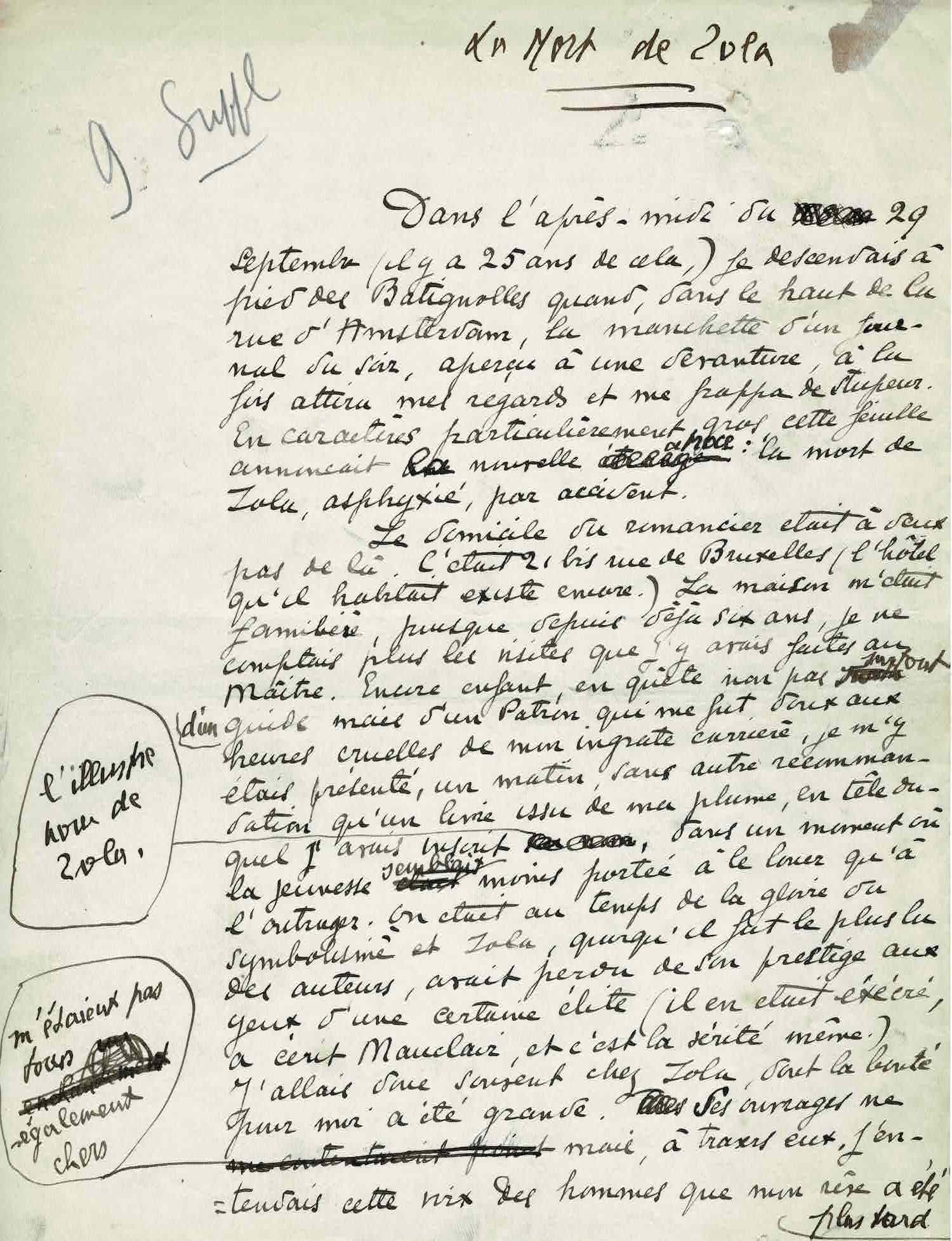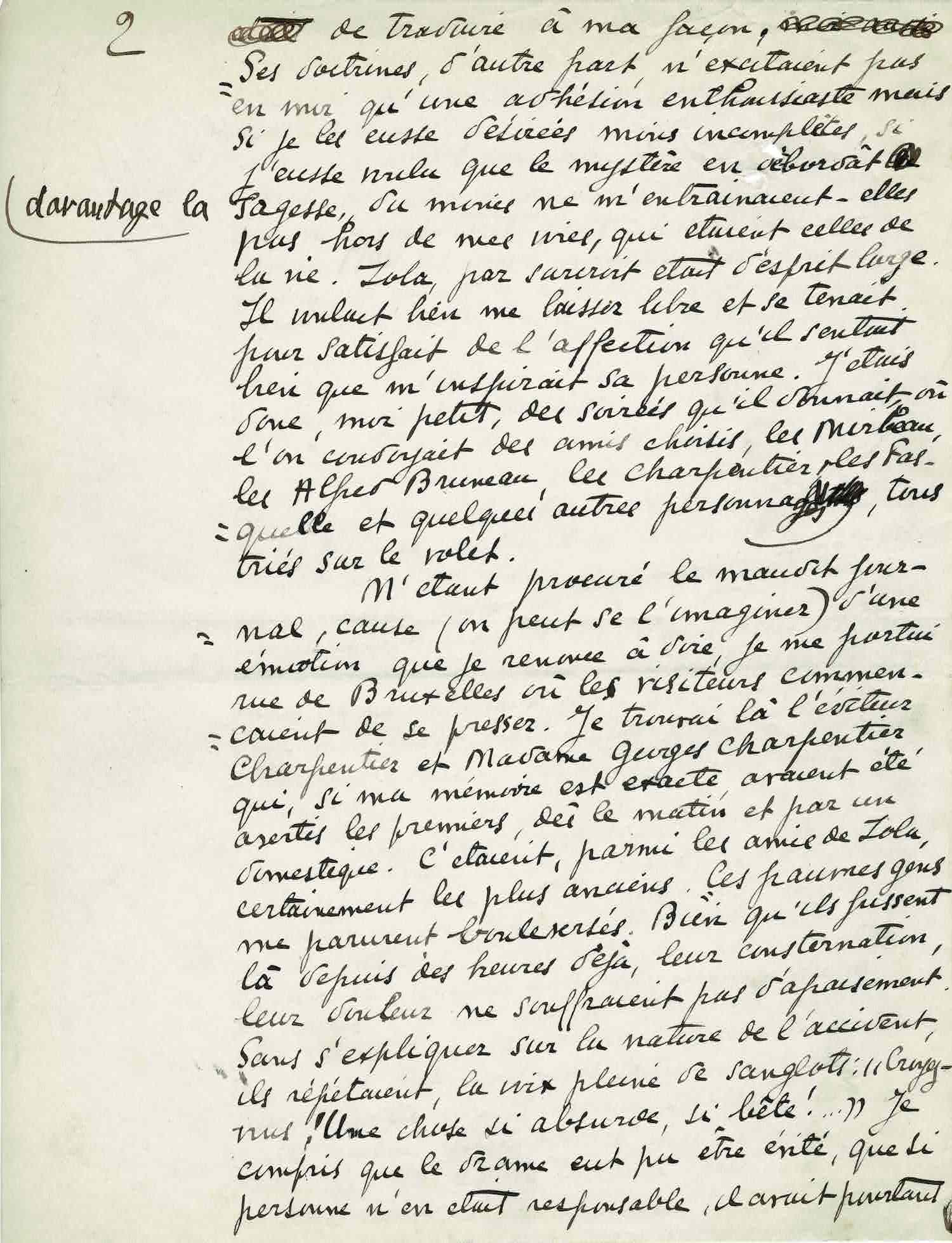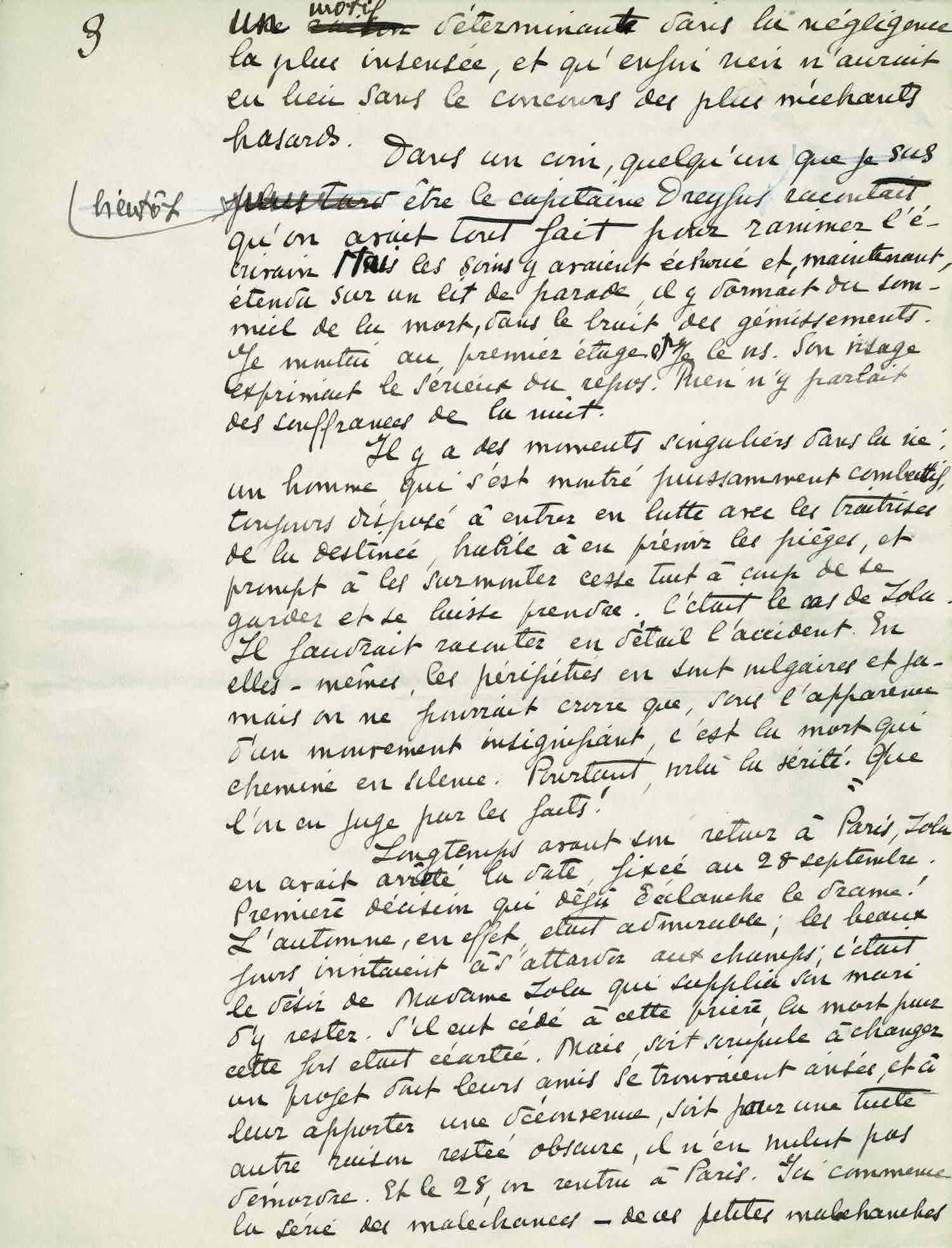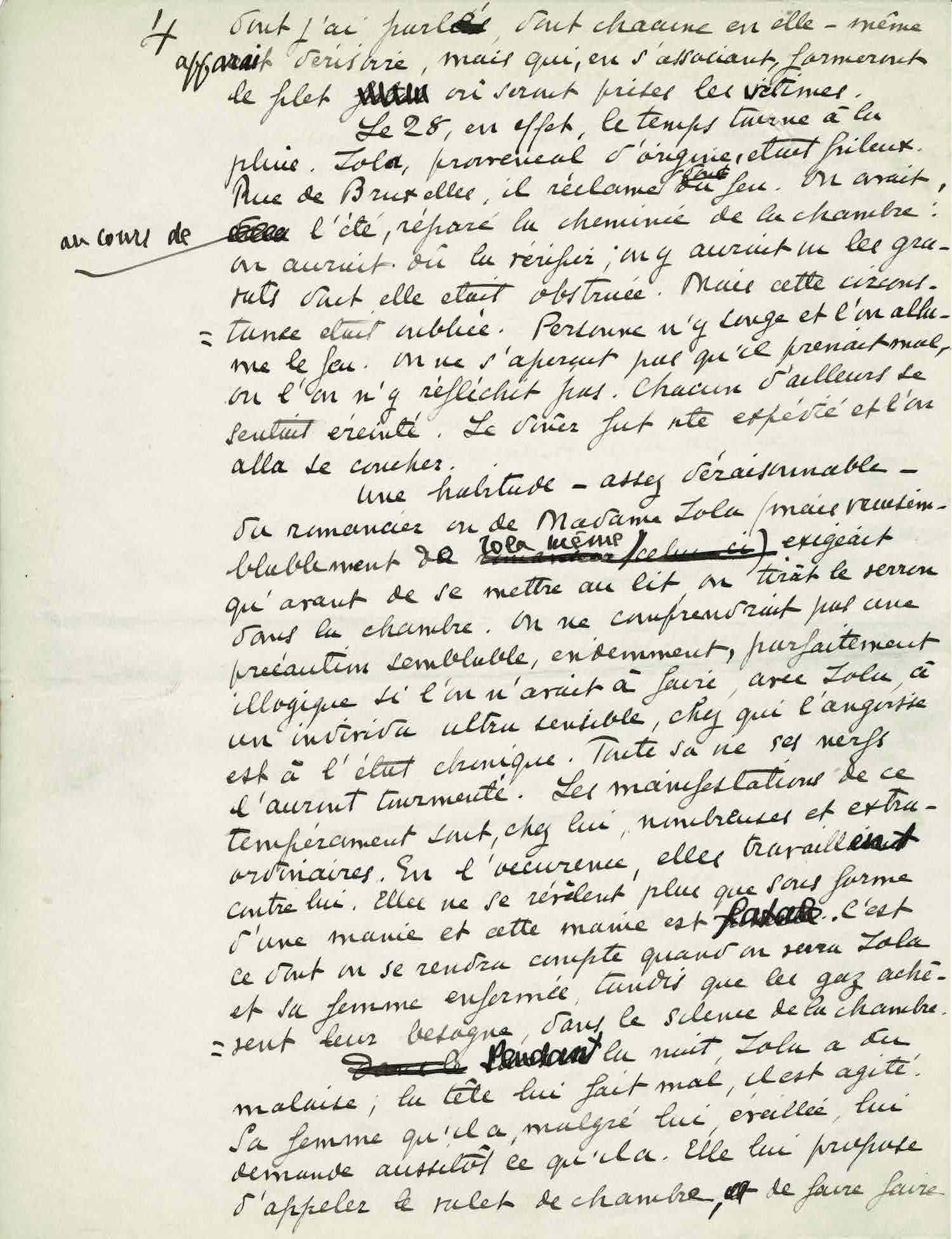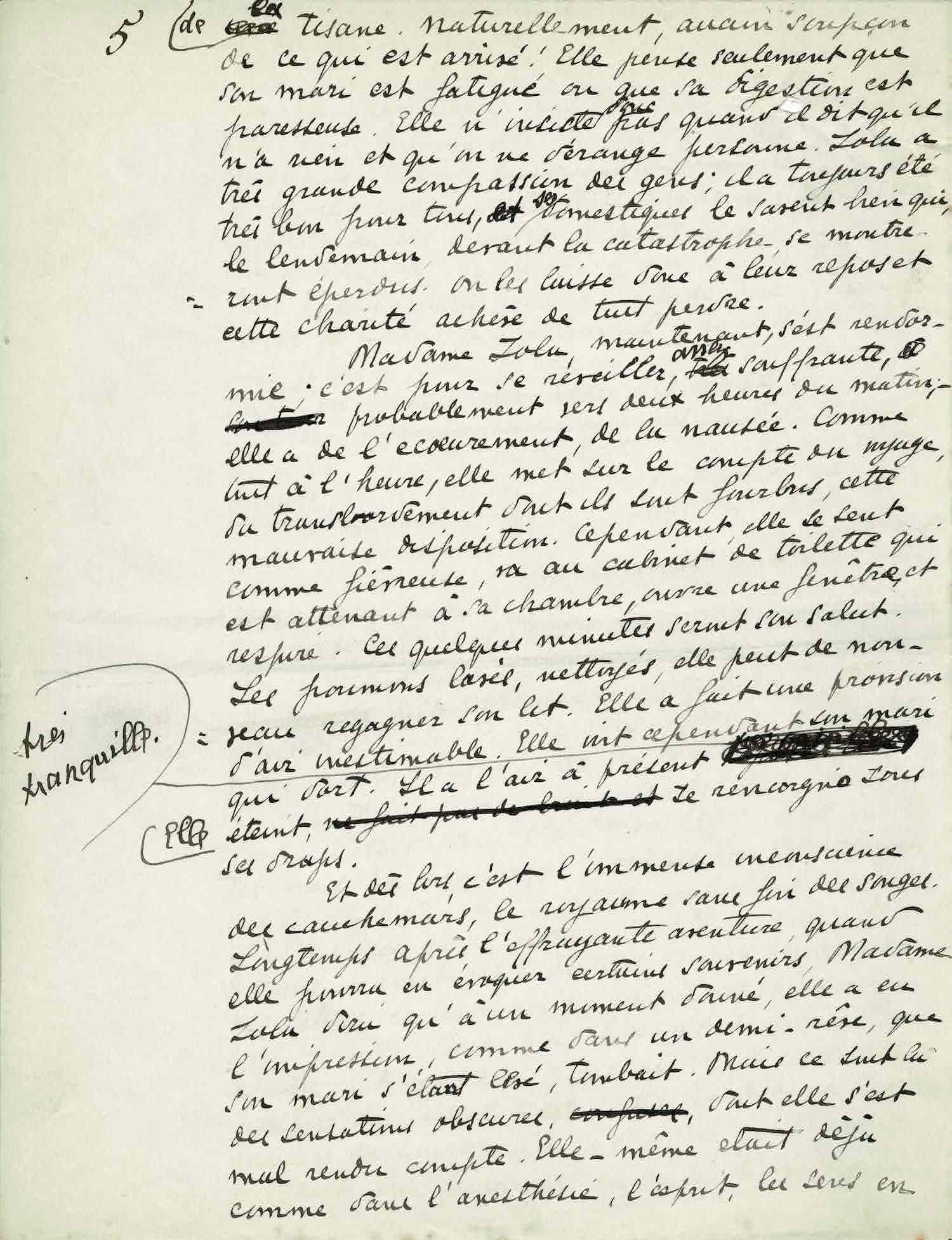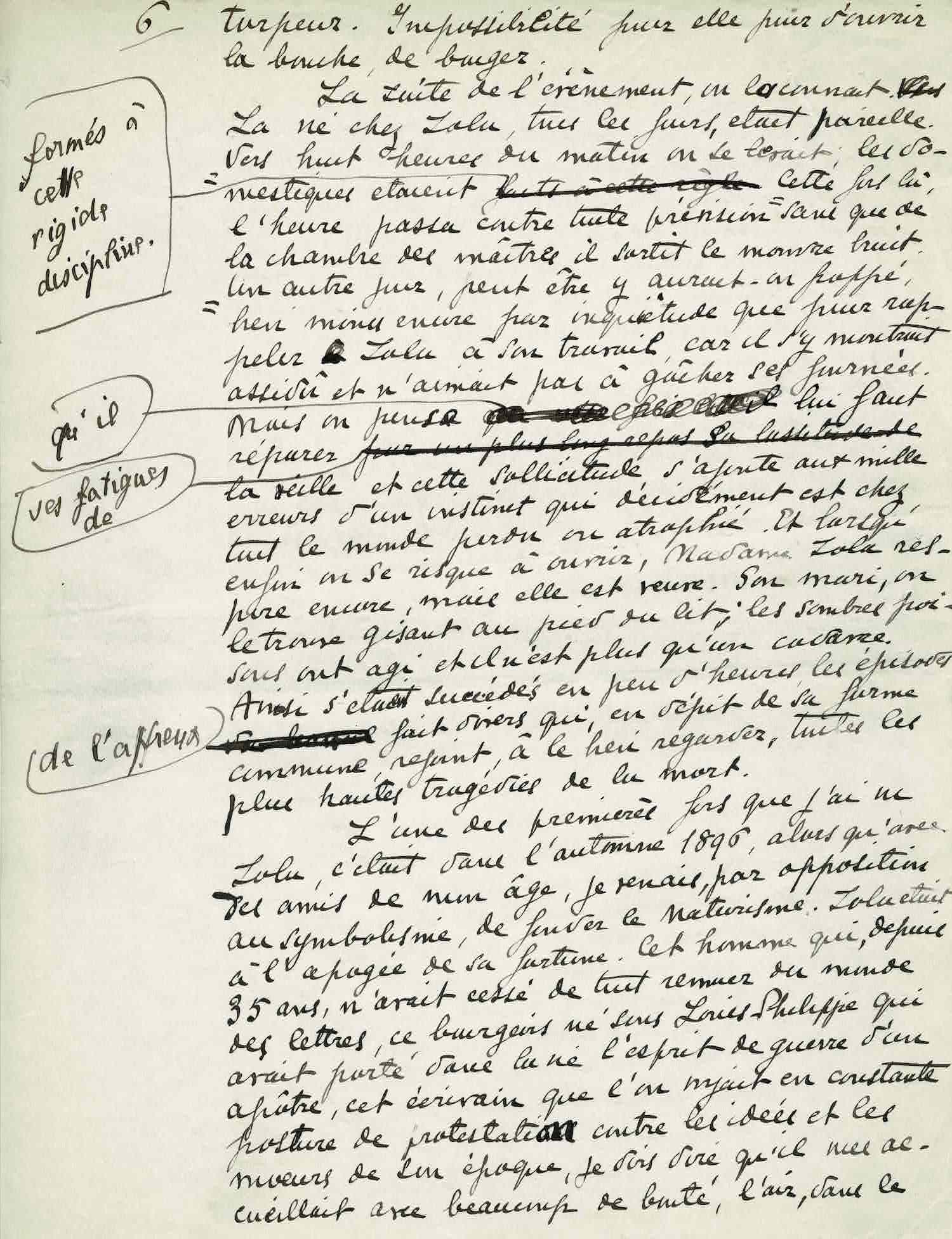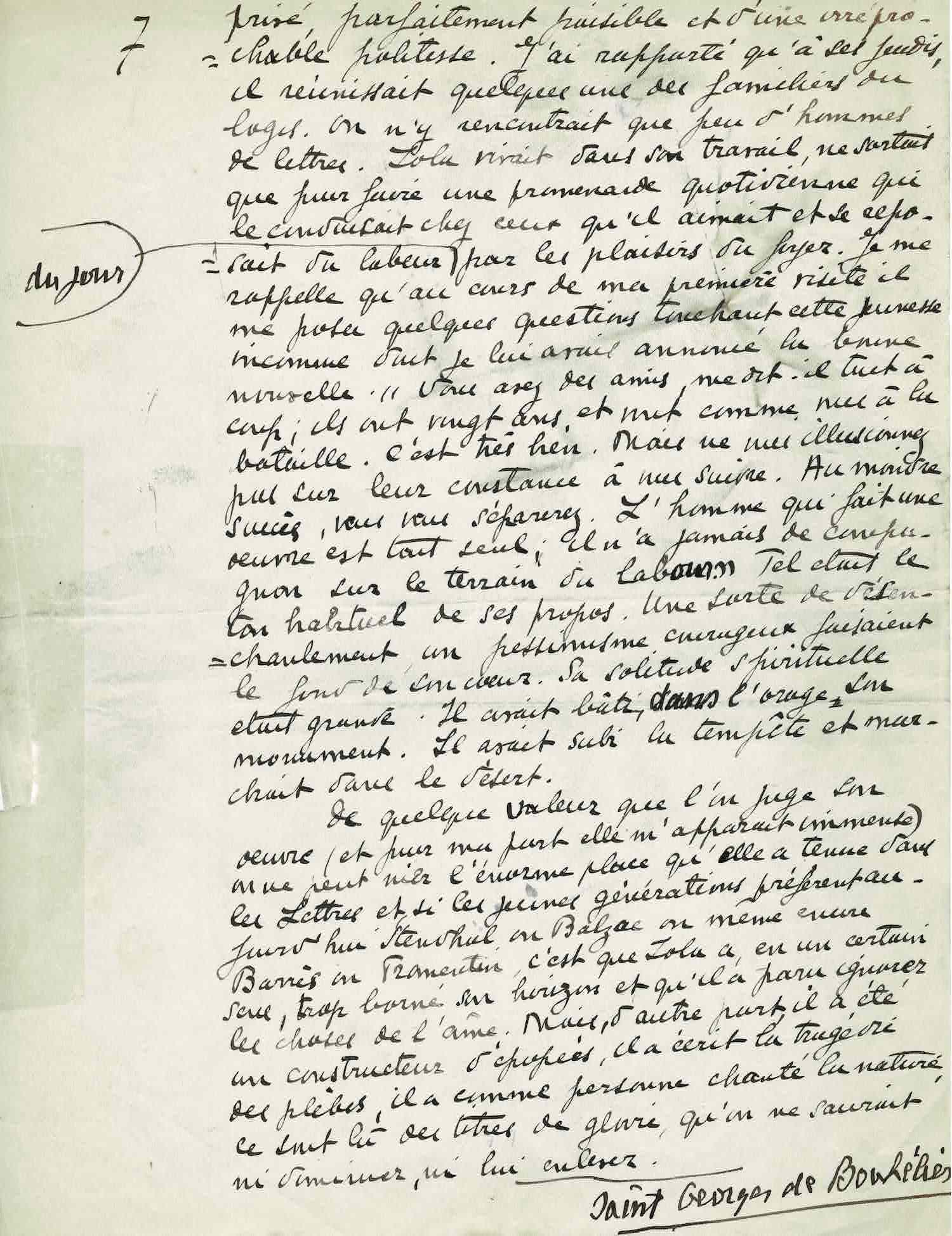SAINT-GEORGES DE BOUHÉLIER (1876-1947)
Signed autograph manuscript – The Death of Zola.
Seven pages in-4°. Erasures, corrections and additions. Slnd. [1927]
“ In a corner, someone who I soon learned to be Captain Dreyfus was saying that everything had been done to revive the writer but the treatment had failed . »
Fascinating testimony, collected by one of his faithful disciples, on the circumstances of the death of Émile Zola.
________________________________________
The Death of Zola.
On the afternoon of September 29 (25 years ago) I was walking down from Batignolles when, at the top of Rue d' Amsterdam, the headline of an evening newspaper, seen in a storefront , both caught my eye and struck me with amazement. In particularly large letters, this sheet announced the atrocious news: the death of Zola , asphyxiated, by accident.
The novelist's home was a stone's throw away. It was 21 bis rue de Bruxelles (the hotel he lived in still exists.) The house was familiar to me, since for six years already, I had stopped counting the visits I had made there to the Master. Still a child, in search not of a guide but above all of a Boss, who was kind to me in the cruel hours of my thankless career, I presented myself there one morning, with no other recommendation than a book from of my pen, at the head of which I had inscribed the illustrious name of Zola, at a time when youth seemed less inclined to praise him than to outrage him . We were at the time of the glory of symbolism and Zola, since he was the most widely read of authors, had lost his prestige in the eyes of a certain elite (he was loathed by it, wrote Mauclair, and that is the truth even.)
So I often went to Zola, whose kindness to me was great. His works were not all equally dear to me, but, through them, I heard this voice of men that my dream was later to translate in my own way. His doctrines, on the other hand, did not arouse in me anything other than an enthusiastic adhesion but if I had wanted them to be less incomplete , if I had wanted the mystery to overflow with more wisdom, at least they would not have enticed me. they were not outside of my lives, which were those of life. Zola, moreover, was broad-minded. He was willing to leave me free and considered himself satisfied with the affection he felt his person inspired in me. So, when I was little, I attended the evenings he gave, where we rubbed shoulders with selected friends, the Mirbeaus, the Alfred Bruneaus, the Charpentiers, the Fasquelles and a few other characters, all hand-picked.
Having obtained the accursed newspaper, the cause (one can imagine) of an emotion that I refuse to express, I went to rue de Bruxelles where the visitors were beginning to flock. There I found the publisher Charpentier and Madame Georges Charpentier who, if my memory serves me correctly, had been the first to be informed in the morning by a servant. They were, among Zola's friends, certainly the oldest. These poor people seemed upset to me. Although they had been there for hours already, their consternation, their pain could not be assuaged without explaining the nature of the accident, they repeated with their voices full of sobs: “Can you believe it! Such an absurd, stupid thing ! ..." I understood that the tragedy could have been avoided, that if no one was responsible for it, there was nevertheless a determining motive in the most senseless negligence, and that finally nothing would have happened without the help of the most wicked people coincidences.
In a corner, someone who I soon learned to be Captain Dreyfus was saying that everything had been done to revive the writer but the treatment had failed and , now, lying on a parade bed, he was sleeping there for a long time. sleep of death , in the sound of groans. I went up to the first floor and saw him. His face expressed the seriousness of rest. Nothing spoke of the sufferings of the night.
There are singular moments in life: a man who has shown himself to be powerfully combative, always willing to enter into battle with the treacheries of destiny, skillful in foreseeing their pitfalls, and quick to overcome them suddenly ceases to keep yourself and let yourself be taken. This was the case with Zola. The accident should be described in detail . In themselves , the adventures are vulgar and one could never believe that, under the appearance of an insignificant movement, it is death which moves in silence. However, here is the truth . Let us judge by the facts !
Long before his return to Paris, Zola had set the date , set for September 28. First decision which already triggers the drama ! The autumn, in fact, was admirable; sunny days invited you to linger in the fields; it was the desire of Madame Zola who begged her husband to stay there. If he had yielded to this prayer, death for this time was averted. But, whether he had scruples about changing a plan of which their friends were aware and causing them disappointment, or for some other reason which remained obscure, he did not want to give up. And on the 28th, we returned to Paris. Here begins the series of misfortunes – of those little misfortunes of which I spoke , each of which in itself appears insignificant, but which, when combined, will form the net in which the victims will be caught.
On the 28th, in fact, the weather turned to rain. Zola, originally from Provence , was cautious . Rue de Bruxelles, he calls for a fire. During the summer, the bedroom chimney had been repaired: it should have been checked; we would have seen the rubble with which it was blocked . But this circumstance was forgotten. Nobody thinks about it and they light the fire. We didn't notice that he was taking it badly, or we didn't think about it. Everyone felt exhausted. Dinner was quickly dispatched and we went to bed.
A habit – quite unreasonable – of the novelist or of Madame Zola (but probably of Zola himself), required that before going to bed, the lock in the bedroom was drawn. We would not understand such a precaution, obviously, perfectly illogical if we were dealing, with Zola, with an ultra-sensitive individual, in whom anxiety is in a chronic state . All his life his nerves will have tormented him. The manifestations of this temperament are numerous and extraordinary in him. In this case, they were working against him. They only reveal themselves in the form of a mania and this mania is fatal. This is what we will realize when we see Zola and his wife locked up while the gases complete their work, in the silence of the room .
During the night, Zola felt unwell; his head hurts, he is agitated. His wife, whom he had awakened despite himself, immediately asked him what was wrong with him. She suggests that he call the valet and have herbal tea made. Naturally no suspicion of what happened! She only thinks that her husband is tired or that his digestion is sluggish. So she doesn't insist when he says that he has nothing and that we're not bothering anyone. Zola has great compassion for people. He has always been very good to everyone, his servants know this well who, the next day, faced with the catastrophe, showed themselves distraught . We therefore leave them to their rest and this charity ends up losing everything.
Madame Zola has now gone back to sleep; it's to wake up, quite unwell, probably around two in the morning; she feels disgusted, nauseated. As before, she blames this bad disposition on the journey, on the transshipment with which they are exhausted. However, she feels feverish, goes to the bathroom adjoining her room, opens a window and breathes. These few minutes will be his salvation. With her lungs washed and cleansed, she can return to her bed again. She made an invaluable supply of air. However, she saw her husband sleeping. He looks very calm now. She turns it off and curls up under her sheets.
And from then on, it is the immense unconsciousness of nightmares, the endless kingdom of dreams. Long after the frightening adventure, when she can recall certain memories of it, Madame Zola will say that at one moment she had the impression, as if in a half-dream, that her husband, having stood up, was falling. But these are obscure sensations, of which she is poorly aware. She herself was already as if in anesthesia, her mind and senses in torpor. Impossible for her to open her mouth, to move.
We know the rest of the event. Life at Zola's house, every day, was the same. Around 8 a.m. we got up; the servants were trained in this rigid discipline. This time, the hour passed against all expectations without the slightest sound coming from the master bedroom. Another day, perhaps, there would have been a knock, even less out of worry than to call Zola back to his work, because he was diligent at it and did not like to waste his days. But we think that he must repair his fatigue from the day before and this concern is added to the thousand errors of an instinct which decidedly lost or atrophied in everyone. And when we finally venture to open, Madame Zola is still breathing, but she is a widow. Her husband is found lying at the foot of the bed, the dark poisons have taken effect and he is nothing more than a corpse. Thus followed, in a few hours, episodes of the dreadful news item which, despite its common form, joins, if looked closely, all the highest tragedies of death.
One of the first times I saw Zola was in the fall of 1896, when with friends of my age , I had just founded Naturism, in opposition to symbolism. Zola was at the height of his fortune. This man who, for 35 years, had never stopped stirring up everything in the world of letters, this bourgeois born under Louis-Philippe who had brought into life the war spirit of an apostle, this writer who we saw in a constant posture of protest against the ideas and customs of his time, I must say that us with great kindness, appearing, in private, perfectly peaceful and impeccably polite. I reported that on his Thursdays, he brought together some of the familiars of the house. There were only a few men of letters to be found there. Zola lived in his work , only going out for a daily walk which took him to the homes of those he loved and resting from the toil of the day with the pleasures of the home. I remember that during my first visit he asked me a few questions concerning this unknown youth whose good news I had told him. “You have friends,” he said to me suddenly; They are twenty years old and go into battle like me. It is very good. But don't be under any illusion about their consistency in following us. At the slightest success, you will separate. The man who does a work is all alone ; he never has a companion on the field of work. » This was the usual tone of his remarks. A sort of disenchantment, a courageous pessimism lay at the bottom of his heart . His spiritual solitude was great. He had built his monument in the storm. He had suffered the storm and was walking in the desert.
Whatever value we judge her work (and for my part it seems immense ) we cannot deny the enormous place she held in Letters and whether the younger generations today prefer Stendhal or Balzac or even Barrès or Fromentin, it is because Zola was, in a certain sense, too limited in his horizon and that he seemed to ignore the things of the soul . But, on the other hand, he was a constructor of epics, he wrote the tragedy of the plebs, he sang of nature like no other, these are titles of glory, which cannot be diminished, nor he to remove. Saint George of Bouhélier »
________________________________________
Founder of Naturism, a movement which aimed to reconcile the beauty of Art and that of Nature, the reality of life and civic virtues, Saint-Georges de Bouhélier, recommended by Zola, in turn supported the writer in his fight for the revision of the Dreyfus trial.
The manuscript presented here, a detailed account of the unfortunate circumstances of Zola's death, constitutes a source of valuable information. We discover in particular the deep sorrow of its publisher and the presence the day after the tragedy of Captain Dreyfus.
If this text also reads as a tribute from a student to his master, a few more detached elements, in the introduction and conclusion in particular, attempt to shed new and objective light on the critical reception of Zola's work at the time of his death.
If the thesis of an accidental death by asphyxiation was immediately adopted and recognized, several late testimonies today make that of the assassination likely: the chimney from which the deadly gases emanated was deliberately obstructed.

